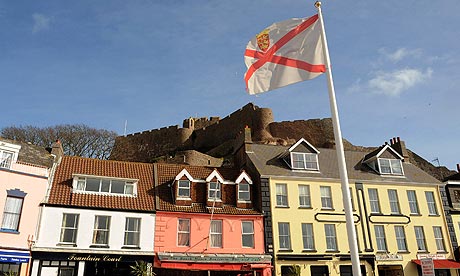Jersey beats UK on financial regulation
IMF rates Jersey ahead of UK on compliance with international financial regulation rules
- guardian.co.uk, Wednesday 16 September 2009 19.35 BST
- Article history
Jersey's Mont Orgueil Castle. The IMF said Jersey complies with 44 of 49 recommendations to cut financial crime. Photograph: Toby Melville/Reuters
Jersey's compliance with international financial regulation and supervision rules is rated ahead of the UK, according to a detailed study by the International Monetary Fund (IMF).

Jersey, which has earned notoriety as a tax haven, complies with 44 of 49 anti-money laundering and financial crime busting recommendations compared with only 36 by the UK.
The IMF's latest assessment has been welcomed by Jersey's financial elite, eager to portray the island as a premier international financial centre rather than a secrecy jurisdiction.
The island has long been seen as an important staging post for washing illicit cash. Sani Abacha, the corrupt former Nigerian leader, made use of a number of bank accounts in Jersey, Liechtenstein, Luxembourg and Switzerland when he looted his country's coffers of hundreds of millions of pounds. The Swiss authorities revealed Jersey's role in the scandal rather than the island's own regulators.
Tens of millions of pounds linked to the slush fund of allegedly corrupt BAE arms deals flowed through Jersey accounts, and of the £1bn siphoned illicitly from Angola's state owned oil firm, huge sums went through the country.
But while rating much of Jersey's financial architecture as meeting international standards set by the Financial Action Task Force, IMF investigators did find fault in some of the island's supervisory arrangements.
In particular, it was concerned that Jersey's regulators had limited knowledge of the activities of special purpose vehicles registered on the island. In addition, the IMF stated there was no "official oversight" of the quality of auditors working in Jersey, though it said arrangements are being made to strengthen this area.
The IMF was also concerned with Jersey's reliance on "intermediaries and introducers" undertaking due diligence assessments of clients. The IMF's financial system stability update stated: "The assessment concludes [Jersey] does not comply fully with the international standard." Jersey, it noted, does not agree.
But Geoff Cook, chief executive of Jersey Finance, said: "The IMF has given Jersey's finance industry a ringing endorsement for the quality of its regulation and legislation, the transparency of its regulatory processes and the robustness and resilience of its banking system.
"In addition, the IMF review has reaffirmed a number of features of Jersey's regulatory and supervisory regime, referring to Jersey as one of the pioneers of the Tax Information Exchange Agreements. It highlights that Jersey's financial institutions and trust company businesses are well supervised to counter terrorist financing and money laundering, and that Jersey's finance industry has continued to maintain open and co-operative relationships with regulatory authorities overseas." The IMF said Jersey's financial industry had been affected by the global crisis, but described financial soundness indicators for institutions licensed on the island as "satisfactory". There have been growing concerns over the financial viability of offshore financial centres as the economic downturn takes its toll. A Treasury report, due next month, is expected to warn ministers that they may have to bail out some UK dependent tax havens.
Though Jersey is projecting a budget deficit of as much as £100m, the IMF said: "Stress tests confirm the [Jersey] system is resilient to a range of shocks. However, there is a high concentration of risk and spill-over risk from parent banks."

No comments:
Post a Comment